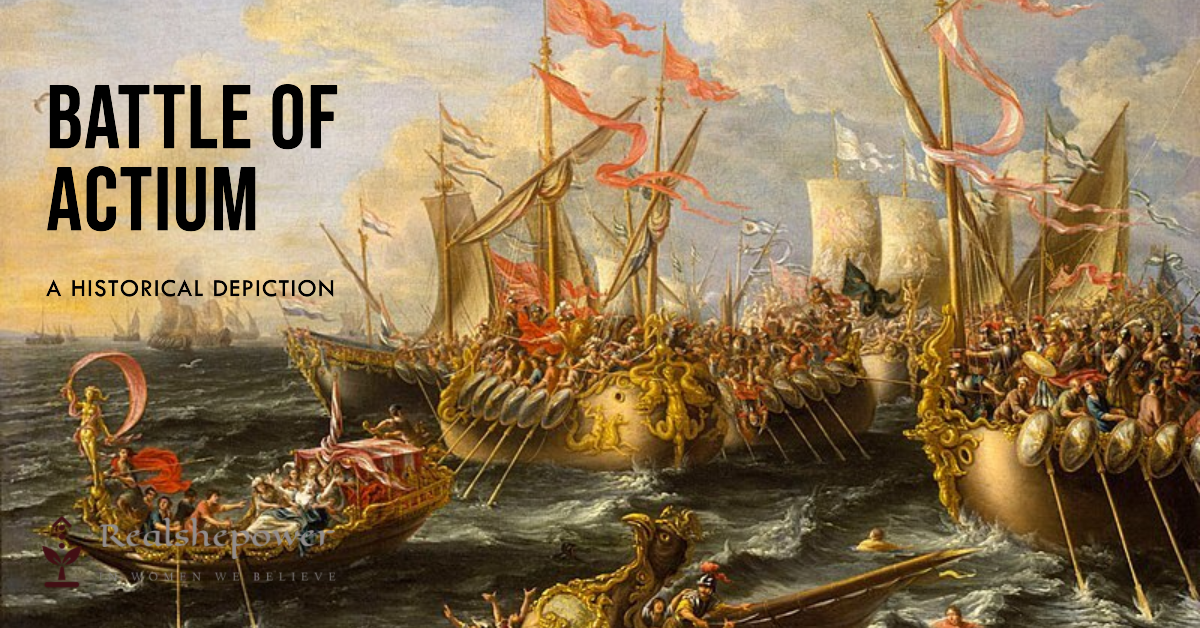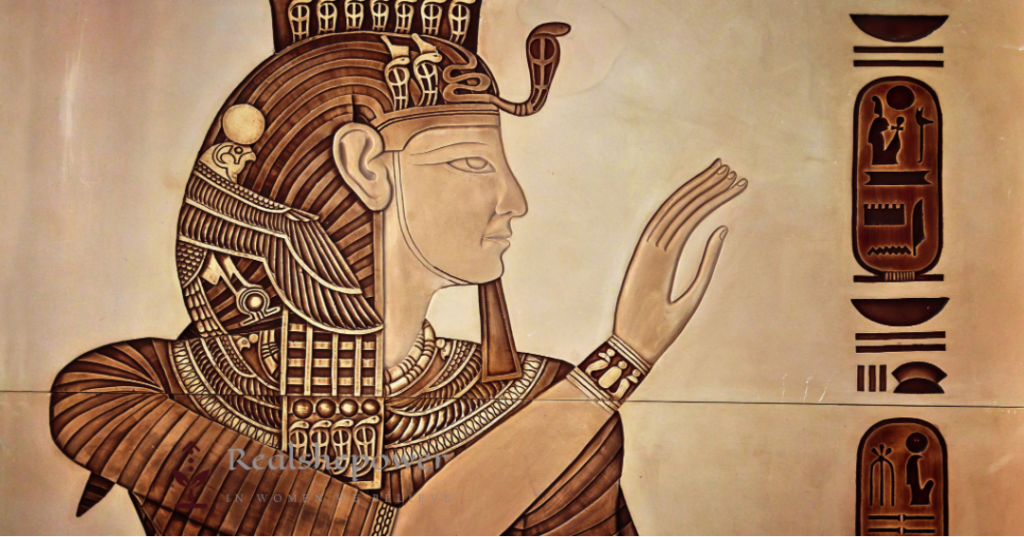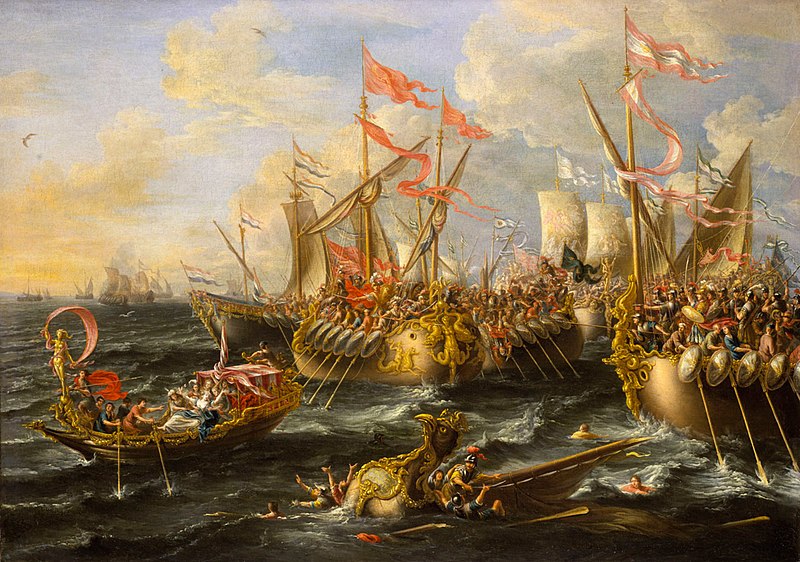The Battle of Actium: Love, Betrayal, and the Fall of Cleopatra


The Battle of Actium stands as a pivotal moment in the life of Cleopatra, a defining chapter that would ultimately seal her fate and mark the end of an era. This monumental clash, fought on the Ionian Sea on September 2, 31 BCE, would bring about the downfall of Cleopatra and her lover, Mark Antony, and pave the way for the rise of Octavian, later known as Augustus Caesar.
Table of Contents
Setting the Stage: The Rivalry between Octavian and Mark Antony

The Battle of Actium was the culmination of a bitter power struggle between Octavian and Mark Antony, two prominent figures in the Roman Republic. The rivalry between these once close allies had been brewing for years, fueled by political ambitions, personal grievances, and a clash of ideologies.
Octavian, Julius Caesar’s adopted son, had risen to power following Caesar’s assassination. He aimed to restore the traditional Roman Republic, while Mark Antony sought to continue Caesar’s legacy and establish a monarchy. Their conflicting visions of Rome’s future set the stage for a dramatic confrontation that would shake the ancient world.
The Love Triangle: Cleopatra’s Influence
At the heart of the conflict lay the intertwined relationships between Cleopatra, Mark Antony, and Octavian. Cleopatra, renowned for her charm and intellect, had captivated Mark Antony, drawing him into a passionate affair that would have far-reaching consequences. The union of Cleopatra and Mark Antony was not only a personal bond but a political alliance, aimed at securing Egypt‘s interests and expanding their influence.
However, this romantic entanglement fueled Octavian’s resentment and provided him with the perfect opportunity to undermine Mark Antony’s credibility. Octavian portrayed Antony as being under the spell of a foreign queen, casting doubt on his loyalty to Rome and using it as a rallying cry to gather support for his cause.
The Naval Clash: Strategies and Betrayals
As the tensions between Octavian and Mark Antony escalated, the stage was set for a decisive battle. The conflict unfolded at Actium, a promontory on the western coast of Greece, where Mark Antony’s fleet faced off against Octavian’s forces.
Mark Antony, renowned for his military prowess, had a formidable navy at his disposal, including Egyptian warships and highly skilled sailors. However, his strategy proved to be his downfall. Antony’s decision to engage in a naval battle played into Octavian’s hands, as the young Roman general had the advantage of a more disciplined and experienced fleet.
As the battle commenced, the forces of Mark Antony and Cleopatra faced a series of setbacks. Antony’s fleet was hampered by internal divisions and the betrayal of key commanders, including Cleopatra’s naval commander, who defected to Octavian’s side. The disarray within Antony’s ranks weakened their defense and left them vulnerable to Octavian’s tactical maneuvers.
Cleopatra’s Controversial Escape: The Beginning of the End

In the midst of the chaos, Cleopatra made a fateful decision that would forever alter the course of history. Sensing the imminent defeat of her lover, she took a bold and controversial step. Cleopatra ordered her own flagship to flee the battle, a move that would be perceived as an act of betrayal by many.
While historians continue to debate Cleopatra’s motives, it is believed that she sought to preserve her own life and maintain her hold on the Egyptian throne. By abandoning Antony and the battle, Cleopatra hoped to negotiate a surrender with Octavian, securing a future for herself and her children.
The Aftermath: Antony’s Demise and Cleopatra’s Final Act
With the tide of the battle turning against him and abandoned by his beloved queen, Mark Antony found himself facing a crushing defeat at the hands of Octavian’s forces. Devastated and disillusioned, Antony made the decision that would seal his tragic fate. Believing that Cleopatra had already betrayed him, he took his own life, falling on his sword.
Upon learning of Antony’s demise, Cleopatra was overcome with grief. In a final act of defiance and despair, she retreated to her mausoleum, where she would meet her own end. The details of Cleopatra’s death are shrouded in mystery, but it is widely believed that she died from the bite of an asp, a venomous snake.
With the victory at Actium, Octavian emerged as the undisputed ruler of Rome and the sole heir to the Roman Empire. He would go on to become Augustus Caesar, the first emperor of Rome, marking the end of the Roman Republic and the beginning of the Roman Empire.
The Battle of Actium not only marked the downfall of Cleopatra and Mark Antony but also the end of the Hellenistic era and the demise of ancient Egypt as an independent kingdom. Egypt would become a Roman province, and its rich culture and traditions would be absorbed into the expanding Roman Empire.
The Myth and Symbolism of Actium
The Battle of Actium has transcended its historical significance to become a symbol of love, betrayal, and tragic destiny. It has been immortalized in literature, art, and popular culture, serving as a cautionary tale of the consequences of passion and ambition.
Actium serves as a reminder of the precarious nature of power and the role that personal relationships can play in the unfolding of historical events. Cleopatra’s choice to align herself with Mark Antony ultimately sealed her own fate and contributed to the fall of her kingdom.
In conclusion, the Battle of Actium stands as a turning point in the lives of Cleopatra and Mark Antony, a clash that would bring about their downfall and pave the way for Octavian’s rise to power. This monumental event continues to captivate us with its tales of love, betrayal, and the complexities of human nature, reminding us of the enduring impact of historical events on the fabric of civilization.
Also Read:
Egypt Travel Guide: Discover the Wonders of This Ancient Land


